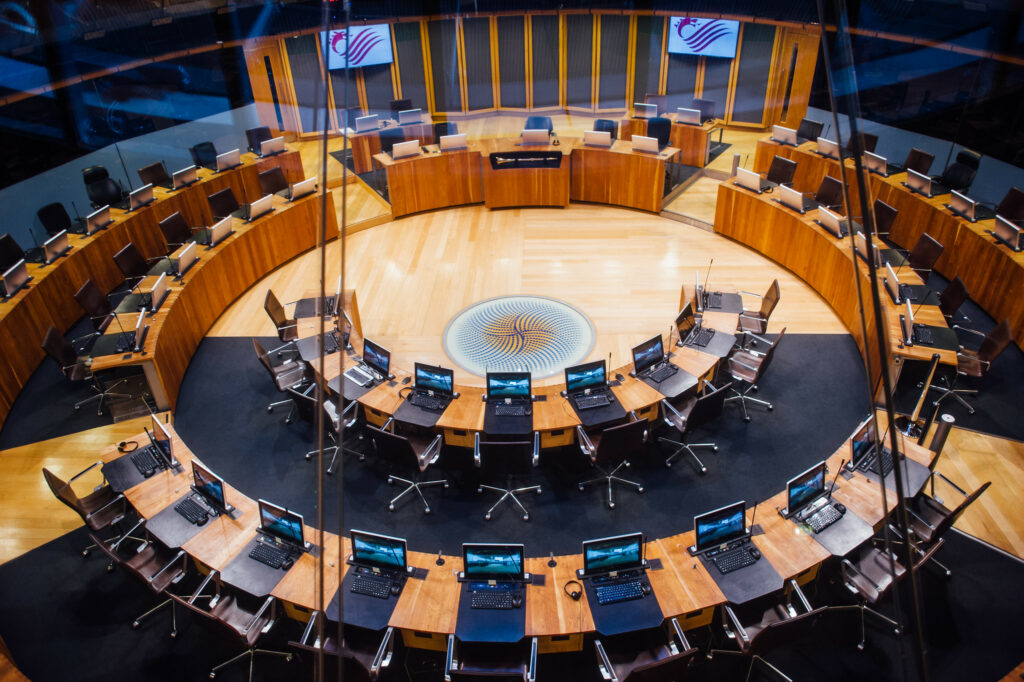Following the announcement of the Welsh Government’s legislative programme, Jess Blair looks back on the history of the Senedd and devolution
Last week, First Minister Mark Drakeford announced the Welsh Government’s plans for legislation for the next year in the Senedd. His statement covered eight new bills which the government hopes will become law.
It was interesting to see the tone of the statement in the Siambr this week – one of ambition and recognition of how far the Senedd has come in its near quarter of a century in existence. And the responses to it recognised this too. Andrew RT Davies, leader of the Welsh Conservatives declared that the ‘…ability to legislate and legislate in a Welsh sense is vitally important’, adding that when he was first elected in 2007, an example of an exciting topic was discussing seed potato regulations from Cyprus and Egypt.
There was a time when the Senedd was unable to pass primary legislation or raise taxes. A major change came in 2006 with the Government of Wales Act that allowed The National Assembly for Wales, as it was known then, had limited powers in the terms of the areas it could scrutinise and what it could actively do in these areas. This changed in 2011 following a referendum, and the Silk Commission on further devolution and the Senedd’s acquisition of new powersin 2017, including those over elections, resulted in further changes.
Since 1999, the Senedd has grown in powers and responsibilities exponentially. This was made clear by the ambition of the legislation the government is now planning to introduce in the next 12 months.
Syniadau uchelgeisiol, awdurdodol a mentrus.
Ymunwch â ni i gyfrannu at wneud Cymru gwell.
Chief among this are three pieces of legislation that will fundamentally reform Welsh democracy.
A Bill to reform the Senedd, increasing its size and changing its voting system is expected when the Senedd returns after the summer recess. This is a long overdue change which ERS has been advocating for around a decade. While the Senedd has radically changed since its inception in 1999, its size has remained stubbornly low – in fact ten councils in Wales are the same size or larger. The First Minister remarked in the Siambr yesterday that the size of the Senedd was raised as an issue by the Richard Commission back in 2004.Since then, the Senedd had gained even more powers and responsibilities so it has been a long time coming. This change will bring Wales closer in line with the Scottish Parliament and Stormont, giving the Senedd the power to scrutinise budgets and legislation and hold the Welsh Government to account more effectively.
The plans outlined by Welsh Government reflect a Senedd that has come of age and one that intends to fundamentally strengthen how it operates.
Another piece of legislation announced yesterday was a Bill to increase the representation of women in the Senedd through gender quotas. Wales once led in women’s representation, as the first parliament to reach 50:50 gender balance, but gender parity has since slipped back. These measures will put in place mechanisms to ensure that our national parliament is properly representative of women in Wales. More must be done to increase the representation of people with other protected characteristics, not least people from ethnic minority backgrounds and disabled people, and we hope to see measures to improve the wider diversity of the Senedd included in this legislation.
A Bill to improve electoral administration will introduce important initiatives to increase the number of people registered to vote in Wales. It is also great to see a commitment to establishing an Electoral Management Board for Wales, which we hope will learn from the model in Scotland.
The plans outlined by Welsh Government reflect a Senedd that has come of age and one that intends to fundamentally strengthen how it operates. Each of these three pieces of legislation is a step towards building a better democracy – one in which every person in Wales feels properly represented. It is a UK- leading package of reform that one that all four nations should be taking note of.
All articles published on the welsh agenda are subject to IWA’s disclaimer. If you want to support our work tackling Wales’ key challenges, consider becoming a member.





